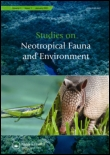
STUDIES ON NEOTROPICAL FAUNA AND ENVIRONMENT
Scope & Guideline
Bridging Theory and Practice in Animal Science and Ecology
Introduction
Aims and Scopes
- Biodiversity Assessment:
The journal emphasizes the documentation of species diversity across various taxa, including mammals, birds, reptiles, amphibians, and invertebrates, often with a focus on endemic and threatened species. - Ecological Interactions:
Research published in the journal frequently explores ecological relationships among species, such as predator-prey dynamics, competition, and mutualism, contributing to a deeper understanding of ecosystem functioning. - Conservation Biology:
A significant portion of the research is dedicated to conservation issues, assessing habitat suitability, population dynamics, and the impacts of anthropogenic activities on biodiversity. - Taxonomy and Systematics:
The journal also plays a crucial role in the taxonomic revision and description of new species, helping to clarify the biodiversity and evolutionary relationships within Neotropical fauna. - Environmental Changes and Impacts:
Studies on the effects of climate change, habitat alteration, and pollution on biodiversity and ecosystem health are a core focus, providing vital insights for conservation efforts.
Trending and Emerging
- Climate Change Impacts:
There is a growing emphasis on studying the effects of climate change on species distributions, behavior, and ecological interactions, reflecting the urgency of understanding how global changes affect Neotropical ecosystems. - Urban Ecology:
Research addressing the impacts of urbanization on biodiversity and ecosystem services is trending, with studies focusing on how urban environments alter species interactions and community dynamics. - Integrative Approaches:
There is an increasing trend towards integrative methodologies that combine molecular techniques, ecological modeling, and traditional fieldwork, facilitating a more comprehensive understanding of biodiversity and its drivers. - Citizen Science and Community Engagement:
Emerging research highlights the role of citizen science in biodiversity monitoring and conservation efforts, showcasing how local communities contribute to data collection and ecological awareness. - Ecosystem Services and Human-Wildlife Interactions:
There is a burgeoning interest in understanding the role of biodiversity in providing ecosystem services and the interactions between wildlife and human activities, which is crucial for sustainable management practices.
Declining or Waning
- Traditional Taxonomic Studies:
While taxonomic research remains essential, there has been a noticeable decline in the number of traditional taxonomic studies focusing solely on species descriptions without ecological context, as more integrative approaches combining ecology and taxonomy gain traction. - Generalized Habitat Studies:
Research that broadly addresses habitat characteristics without specific ecological or conservation implications appears to be waning, as studies increasingly focus on detailed, context-driven assessments of habitat use and species interactions. - Invasive Species Reports:
Though still relevant, the frequency of standalone studies on invasive species without an integrative ecological framework has decreased, as researchers are now more focused on the impacts of invasives within broader ecological and conservation contexts.
Similar Journals

Diversity-Basel
Shaping the future of biodiversity conservation through cutting-edge research.Diversity-Basel is a premier open-access journal published by MDPI, specializing in the vital fields of agricultural, biological, and ecological sciences. Launched in 2009, this multidisciplinary journal, operating from Switzerland, aims to disseminate high-quality research that advances the understanding of biodiversity and ecosystem dynamics. With an impressive impact factor and notable rankings in Scopus, including Q1 classification in Agricultural and Biological Sciences and strong positions in Ecology and Ecological Modeling, Diversity-Basel stands as a valuable resource for global researchers, professionals, and students alike. Its commitment to accessibility enables researchers to reach a wider audience, fostering collaboration and innovation in addressing pressing environmental challenges. By providing an inclusive platform for diverse scientific inquiries and innovations, Diversity-Basel plays an essential role in shaping the discourse on biodiversity conservation and management, encouraging the pursuit of sustainable solutions in our rapidly changing world.

Acta Herpetologica
Your Gateway to Herpetological InsightsActa Herpetologica, published by FIRENZE UNIV PRESS, is a reputable Open Access journal dedicated to the field of herpetology, encompassing research on amphibians and reptiles. Established with the aim to foster scientific discourse, this journal has made its content freely accessible since 2006, enabling researchers, professionals, and students to engage with a diverse array of studies and findings. As of 2023, the journal is categorized in Q3 of Animal Science and Zoology and ranks 357 out of 490 in the Scopus database, reflecting its contribution to the field and providing a platform for high-quality research. The journal showcases manuscripts that cover a wide range of topics, from ecology and conservation to physiology and evolution, supporting global efforts to understand and preserve herpetofauna. With a convergence period spanning from 2009 to 2024, Acta Herpetologica continues to be an essential resource for advancing academic knowledge and facilitating discussions in herpetological research.
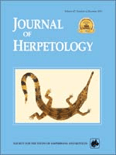
JOURNAL OF HERPETOLOGY
Illuminating the Ecology of Amphibians and ReptilesJOURNAL OF HERPETOLOGY, published by the SOCIAL STUDY AMPHIBIANS REPTILES, is a premier platform dedicated to the advancement of knowledge in the field of herpetology, encompassing the study of amphibians and reptiles. With a dedicated ISSN of 0022-1511 and E-ISSN 1937-2418, this esteemed journal has been enriching the scientific community since its inception, with contributions spanning from 1980 to 1983 and from 1985 to 2024. As a notable entry in the Q3 category for both Animal Science and Zoology, as well as Ecology, Evolution, Behavior and Systematics in 2023, it maintains a competitive presence with a Scopus rank in the 40th and 33rd percentiles within its respective fields. Although it does not currently offer Open Access, the journal aims to foster a deeper understanding of the ecological and evolutionary dynamics of herpetofauna, making it an essential resource for researchers, professionals, and students alike. Whether you are exploring conservation strategies or evolutionary patterns, JOURNAL OF HERPETOLOGY remains a vital contributor to ongoing discussions and discoveries in the scientific exploration of reptiles and amphibians.
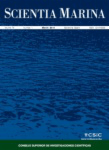
SCIENTIA MARINA
Connecting Scholars to the Wonders of the SeaSCIENTIA MARINA, an esteemed journal published by the Consejo Superior Investigaciones Cientificas (CSIC) in Spain, focuses on critical studies within the fields of Aquatic Science and Oceanography. With an Open Access policy since its inception in 1998, this journal facilitates widespread dissemination of research findings, significantly enhancing accessibility for researchers, professionals, and students alike. Currently, SCIENTIA MARINA holds a Q3 ranking in both categories for 2023, demonstrating its commitment to advancing knowledge in marine and aquatic environments. With a convergence of research years from 1996 to 2024, it remains a pivotal platform for innovative research, encompassing various aspects of marine biology, ecology, and environmental science. The journal serves as an essential resource for scholars aiming to contribute to the understanding and preservation of marine ecosystems.

AMPHIBIAN & REPTILE CONSERVATION
Empowering Conservationists with Open Access KnowledgeAMPHIBIAN & REPTILE CONSERVATION, published by the Amphibian Conservation Research Center & Lab, is a leading journal dedicated to the field of herpetology and environmental conservation. With an ISSN of 1083-446X and an E-ISSN of 1525-9153, this journal serves as a vital resource for researchers, conservationists, and students interested in the preservation of amphibian and reptile species. The journal has achieved remarkable rankings, categorized in the Q2 quartile for Animal Science and Zoology, Ecology, and Nature and Landscape Conservation as of 2023, reflecting its significant contribution to the scientific community. Over the converged years from 2016 to 2024, the journal has established itself as an integral platform for disseminating research findings, fostering collaboration, and enhancing the understanding of biodiversity and ecosystem dynamics. By embracing an open-access approach, AMPHIBIAN & REPTILE CONSERVATION ensures that critical research is readily available to a global audience, promoting informed conservation efforts and policy advocacy to safeguard these vital species amidst their declining populations.

Journal of Fish and Wildlife Management
Navigating the future of fish and wildlife conservation.The Journal of Fish and Wildlife Management, published by the U.S. Fish & Wildlife Service, serves as a vital resource for scholars, researchers, and professionals in the fields of Animal Science, Ecology, and Conservation Biology. With its ISSN 1944-687X, this esteemed journal has been disseminating critical research findings since 2010, contributing significantly to the understanding of fish and wildlife conservation practices and their ecological impacts. Despite its Q3 category rankings in various disciplines as of 2023, it provides a platform for innovative research that influences policy and management strategies for biodiversity conservation. The journal, although not open access, remains committed to advancing the scientific discourse surrounding wildlife management with articles that emphasize practical conservation efforts and ecological sustainability. Readers can expect a diverse range of articles that promote best practices in the management and conservation of fish and wildlife resources, furthering our collective mission of preserving ecological health and biodiversity for future generations.
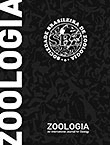
Zoologia
Elevating the Study of Animal EcologyZoologia, published by the SOC BRASILEIRA ZOOLOGIA and UNIV FEDERAL PARANA, is a premier open-access journal dedicated to the field of zoology and related disciplines. Established in 2009 and based in Brazil, this journal has quickly positioned itself as a vital resource for researchers, professionals, and students, providing a platform for innovative research and comprehensive reviews in animal science and zoology. With an H-index indicative of its growing citation impact and a current Scopus ranking placing it in the 46th percentile of its category, Zoologia focuses on increasing the visibility and accessibility of cutting-edge zoological research. The journal aims to advance the understanding of animal biology, ecology, and conservation, making it an essential read for those invested in animal science. As an open-access publication, it ensures that knowledge dissemination is unrestricted, fostering a collaborative scientific community striving towards impactful conservation and biodiversity initiatives.

Redia-Journal of Zoology
Elevating research in zoology and beyond.Redia-Journal of Zoology, published by the CRA-Research Centre Agrobiology & Pedology in Italy, is a distinguished academic journal dedicated to advancing the field of zoological studies through high-quality research and insightful reviews. With an ISSN of 0370-4327, this journal provides a platform for scholars and practitioners in the Agricultural and Biological Sciences to disseminate their findings and engage in meaningful discourse. Recognized in the 2023 Scopus rankings as Q2 in its category, Redia occupies a notable position within the global research community, ranked 138 out of 221 in Agricultural and Biological Sciences. The journal has a commitment to publishing original research from 2011 until 2024, contributing to the body of knowledge in diverse sub-disciplines of zoology, ecology, and conservation. While currently not open access, Redia strives to foster collaboration and discussion among researchers, making it a vital resource for advancing zoological sciences.
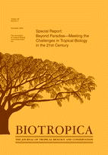
BIOTROPICA
Shaping biodiversity insights for tomorrow's challenges.BIOTROPICA is a premier journal published by Wiley, specializing in the fields of Ecology, Evolution, Behavior, and Systematics. With a robust impact factor and positioned in the Q1 category in its field, it stands out as a leading source of research that informs and shapes our understanding of biodiversity and ecosystem management. Since its inception in 1979, BIOTROPICA has been dedicated to publishing high-quality articles that advance scientific knowledge and foster conservation efforts globally. Researchers and professionals alike value the journal for its rigorous peer-review process and its influence in academic discourse, demonstrated by its Scopus ranking placing it in the 70th percentile among its peers. While the journal does not currently offer open access, it continues to be a vital resource for those engaged in the study of biological systems, making significant contributions to the advancement of ecological science. Readers can expect to find a wealth of innovative research and perspectives that are critical to addressing contemporary environmental challenges.

ACTA OECOLOGICA-INTERNATIONAL JOURNAL OF ECOLOGY
Illuminating Pathways to Sustainable SolutionsACTA OECOLOGICA-INTERNATIONAL JOURNAL OF ECOLOGY, published by Elsevier, stands as a prominent platform for disseminating innovative research in the diverse field of ecology. Operating since 1983 and continuing to make significant contributions into 2024, this journal features critical studies that advance our understanding of ecological systems, behaviors, and conservation efforts. With an impressive Q2 ranking in both the ecology and nature conservation categories, it exemplifies high-quality scholarship, reflected in its Scopus rankings—#74 in Environmental Science and #254 in Agricultural and Biological Sciences. Researchers, professionals, and students in the field are invited to explore the latest findings and methodologies that address pivotal ecological issues. As a journal committed to fostering academic collaboration, ACTA OECOLOGICA is essential for anyone dedicated to enhancing their comprehension of ecological dynamics and advancing sustainability practices globally.